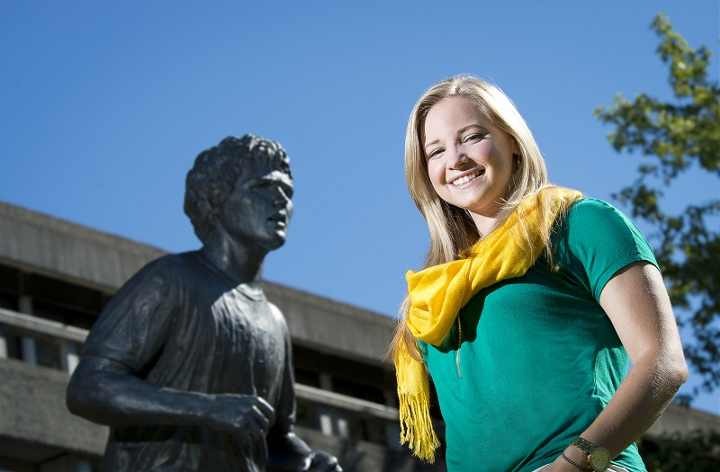A patient’s cancer battle is usually considered victorious once they enter remission. Yet, for survivor Christine Tulloch, 28, learning she was cancer-free was by no means the end of the fight.
“The cancer is decimated, but so are you. Like a soldier at the end of the war, you need help putting yourself back together,” says Tulloch. “Only everyone has gone home, since they assume that the war has been won.”
At age 19, Tulloch was diagnosed with acute lymphoblastic leukemia (ALL), a cancer most typically seen in children. Stomach aches and nosebleeds had brought her repeatedly to the doctor. On her third visit, blood work was ordered. Then came the leukemia diagnosis.
The young woman stopped her university studies and travelled from Langley to Vancouver’s BC Children’s Hospital for 2.5 years of intense chemotherapy treatments, as well as transfusions, bone marrow biopsies, extensive blood tests, and lumbar punctures.
She lost her long blonde hair and all of her muscle mass, but fortunately went into remission in the early months of treatment. By 2009, doctors encouraged Tulloch to resume her studies (she was majoring in English and minoring in counseling at Simon Fraser University) and get back to normal life – something that would prove to be nearly as challenging as defeating cancer.
Her brain felt foggy from the chemotherapy treatments and it was hard to focus on her classes. Physical limitations prevented her from returning to her job as a lifeguard. Money was tight and finances were a constant concern. More than anything, however, Tulloch recalls feeling “lost and alone.”
“There was an overwhelming amount of guilt at being alive and wishing I weren’t,” remembers Tulloch. “I reached a very low point, and it was during this low that I knew that I had to seek help.”
Nearing rock bottom, Tulloch went to a school counselor, who referred her to a psychologist that diagnosed post-traumatic stress disorder and major depression – something that came as a huge relief to the young woman.
“[Once] I knew what it was, I could fight it,” she explains. “I am a warrior, and after kicking cancer I knew I could do this too.”
And kick it she did. Tulloch graduated with her Bachelors of Arts and Social Sciences in 2014, was awarded the prestigious Terry Fox Gold Medal Award for her courage in the face of adversity, and gave the convocation speech for her graduating class at SFU.
Earlier this year, Tulloch shared her story with B.C. MLAs and ministers during a cancer research information session hosted by TFRI’s BC Node Regional Advisory Committee.
A nature lover and avid baker, the young woman currently works as an administrator for a non-profit that supports the oncology and hematology programs at BC Children’s Hospital. Connecting with cancer survivors is integral to her life, and she organizes an annual glamour night for other young women battling the disease.
But that’s not all: Tulloch is also now completing her master’s degree in counseling at the University of Athabasca. Her dream is to help develop better post-cancer treatment programs for young adult patients in Canada, so that no one feels alone after beating cancer.
“Maybe I could be that person of understanding during someone’s moment of complete darkness,” Tulloch says. “Every one of our cancer warriors deserve that, and I am determined to make it so.”
